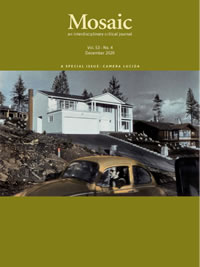Issue 53.4
Overview

Special Issue: Camera Lucida: Reflections on Photography
Published: December 2020
View the issue introduction or see the issue summary and contents below.
8 essays, totalling 184 pages
$24.95 CAD
Mosaic 53.4 is a special issue on Roland Barthes’s Camera Lucida: Reflections on Photography. Forty years after its publication, the book still garners attention. Responses to this short, elegant, and personal text range wildly from irrelevance, anger, and dismissal to constituting something of a recurrent trope in writing on the theory of photography. If artists and photographers have no time for the book and little or nothing to say, theorists of photography and theorists more generally are a different story. And it has been this way since its publication in French in 1980 and in English in 1981. This special issue presents essays by Jeff Fort, Johnnie Gratton, Kathrin Yacavone, Bill Scalia, Kris Pint and Maria Gil Ulldemolins, and Thomas O’Grady. The issue opens with an interview with Vancouver-based photographer Ian Wallace, whose 1973 La Mélancolie de la Rue is featured on the cover, and an archive of photographs of André Zougrana curated by Vincent Meessen.
CorpusVincent Meessen In 2006, while preparing to shoot his 2009 essay film Vita Nova, Vincent Meessen met a dozen former military cadets who were once based in Ouagadougou, Burkina Faso; Bingerville, Ivory Coast; and Kati, Mali, three of four cities where France had instituted cadet corps programs and schools. Meessen was looking for a cadet named Diouf, who was featured on a Paris Match cover in 1955 and famously singled out in Mythologies by Roland Barthes. Amongst the personal photographic archives Meessen documented then were the portraits of André Zougrana, one of the “enfants de troupe” who had visited France for the military parade of 1955. They offer a set of radical counterpoints to Walter Rizzo’s 1955 Paris Match cover shot. | |
Crossings: A Conversation with Ian WallaceShepherd Steiner The following interview with Ian Wallace was conducted electronically in 2020. Mosaic is pleased to publish it here. | |
L’Antichambre littéraire: Roland Barthes’s Regressive SearchJeff Fort This essay shows that Roland Barthes’s La Chambre claire, a work engaged in a revolt against the author’s former critical positions, is overdetermined by a desire, announced contemporaneously in his seminars, to write a novel roughly modeled on the Proustian Search; that this Search, as echoed and pursued in this text, drastically distorts and narrows its treatment of photography; and that this restricted treatment of photography, centred on the well-known studium/punctum distinction, reveals a troubling impassivity before images of historical violence, which in turn is linked with a number of regressive gestures and attitudes with deep and likewise troubling political implications. | |
Camera Lucida: Obscured in TranslationJohnnie Gratton This essay reveals a range of problems besetting Richard Howard’s translation of Roland Barthes’s La Chambre claire. It seeks first to gauge losses of equivalence and failures of understanding in Camera Lucida, and second to show how these can negatively impact scholarly work addressing Barthes’s text through Howard’s. | |
The Photograph as Trace: Barthes, Benjamin, and the Intermediality of Photographic DiscourseKathrin Yacavone Drawing on archival discoveries, this essay analyzes the specific publications and material-cultural contexts linking Barthes’s and Benjamin’s theories of photography. It focuses on the research and writing of La Chambre claire, its visual allusions to the “Little History of Photography,” and the wider circulation of the photographs central to these texts. | |
The Icon Machine: Expenditure and Third Meaning in Camera LucidaBill Scalia In Camera Lucida, Barthes locates death in the photograph in the lack of a referent, the absence behind the image. I will suggest a model by which the image does not necessarily hold absence, but might also signify a living reality beyond the photographic plane—that is, iconic. | |
Roland Barthes and the ‘Affective Truths’ of AutotheoryKris Pint and Maria Gil Ulldemolins This essay discusses methodological issues raised by Barthes’s La Chambre claire within the context of his later work. It examines Barthes as a precursor of autotheory, an umbrella term applied to writing (and other cultural expressions) that combines reflections on art and theory with an exploration of intimate life. | |
At Bear River Station: A Snapshot of Place and TimeThomas O’Grady Reading a century-old photograph through the lens of Roland Barthes’s Camera Lucida, this essay examines how even a random snapshot can provide an illuminating “peephole” into the past. In this case the past is a liminal moment in both family history and the history of the Prince Edward Island Railway. |